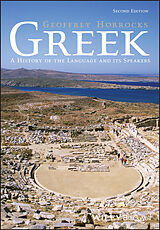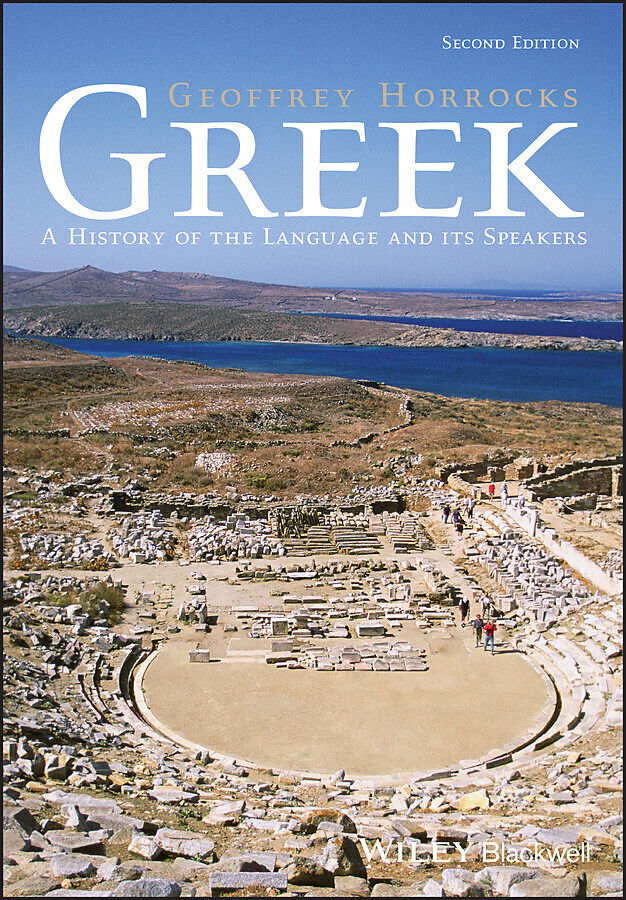Greek
Format:
E-Book (pdf)
EAN:
9781444318920
Untertitel:
A History of the Language and its Speakers
Genre:
Sprach- und Literaturwissenschaft
Autor:
Geoffrey Horrocks
Herausgeber:
Wiley-Blackwell
Auflage:
2. Aufl.
Anzahl Seiten:
528
Erscheinungsdatum:
15.12.2009
ISBN:
978-1-4443-1892-0
Greek: A History of the Language and its Speakers, Second Edition reveals the trajectory of the Greek language from the Mycenaean period of the second millennium BC to the current day.
* Offers a complete linguistic treatment of the history of the Greek language
* Updated second edition features increased coverage of the ancient evidence, as well as the roots and development of diglossia
* Includes maps that clearly illustrate the distribution of ancient dialects and the geographical spread of Greek in the early Middle Ages
Autorentext
Geoffrey Horrocks is Professor of Comparative Philology at the University of Cambridge, UK, and Fellow of St John's College. His previous books include Space and Time in Homer (1981), Generative Grammar (1987), Greek: A History of the Language and its Speakers (1997), and The Blackwell History of the Latin Language (with James Clackson, 2007).
Klappentext
"Highly recommended. Lower-division undergraduates through faculty; general readers." Choice "one of Horrocks' greatest achievements is the skill with which he demonstrates the special value of the history of Greek, thinking about the Greek language in terms of breadth and depth that are unusual among linguists working on Greek." Bryn Mawr Classical Review "Horrocks offers an exemplary, and unique, survey of the development of the Greek language from its Mycenaean beginnings to the present day, with a particular emphasis on the reasons for Greek's linguistic conservatism. Widely read and much praised in its first edition, this expanded and revised second edition is to be recommended even more highly to all those interested in Greek of any period." Elizabeth Jeffreys, University of Oxford Greek: A History of the Language and its Speakers traces the trajectory of the Greek language from the Mycenaean period of the second millennium BC to the current day. Widely celebrated upon its original release, this greatly expanded Second Edition explores the evolution of the Greek language in its regional and social heterogeneity and in both its spoken and written forms. Beginning in the ancient world with the emergence and dominance of the Attic dialect in the 5th and 4th centuries BC, the book goes on to examine the subsequent development of the language during the Hellenistic and Roman periods. The text explores the tension between written varieties and evolving forms of the vernacular and the resultant 2000 years of diglossia – the ever-growing gulf between what was said and what was written, and the linguistic consequences. Other topics addressed include the ancient Greek dialects, epigraphic and literary; the impact of the adoption of Greek by the Macedonians, Romans, and as a lingua franca in the East; the role of Greek in the development of Latin and modern European languages; and the position of different forms of Greek in the medieval Byzantine state. Finally, more recent problems of establishing a standard language and education system in the independent Greek state that emerged in the early 19th century are revealed, as well as the ongoing legacy of diglossia into the 1970s. Unmatched in breadth of material and scholarly rigor, Greek: A History of the Language and its Speakers, Second Edition, remains the essential resource on the development of the Greek language.
Zusammenfassung
Greek: A History of the Language and its Speakers, Second Edition reveals the trajectory of the Greek language from the Mycenaean period of the second millennium BC to the current day. Offers a complete linguistic treatment of the history of the Greek language Updated second edition features increased coverage of the ancient evidence, as well as the roots and development of diglossia Includes maps that clearly illustrate the distribution of ancient dialects and the geographical spread of Greek in the early Middle Ages
Inhalt
Preface to the First Edition xii Preface to the Second Edition xv IPA Chart xvii The Greek Alphabet xviii Introduction: The Scope and Purpose of This Book 1 Part I Ancient Greek: From Mycenae to the Roman Empire 7 1 The Ancient Greek Dialects 9 1.1 The Coming of the 'Greeks' to Greece 9 1.2 The Earliest Records: Mycenaean Greek 10 1.3 Greek Dialect Relations and the Place of Mycenaean 13 1.4 Some Examples 24 1.4.1 Some basic dialect characteristics 24 1.4.2 West Greek 28 (a) Laconian 28 (b) Cretan 29 (c) Elean 30 (d) Phocian 31 1.4.3 Aeolic 32 (a) Boeotian 32 (b) Thessalian 33 (c) Lesbian 34 1.4.4 East Greek 36 (a) Arcadian 36 (b) Ionic 37 (c) Attic 40 2 Classical Greek: Official and Literary 'Standards' 43 2.1 Introduction 43 2.2 The Language of Homer and its Influence 44 2.2.1 Ionian epic 44 2.2.2 Ionian elegy and iambus 49 2.2.3 Personal lyric 50 2.2.4 Choral lyric 53 2.2.5 Athenian drama 56 2.3 Official and Literary Ionic 60 3 The Rise of Attic 67 3.1 Attic as a Literary Standard 67 3.2 'Great Attic' as an Administrative Language 73 4 Greek in the Hellenistic World 79 4.1 Introduction 79 4.2 The Koine as an Extension of Great Attic 80 4.3 The Impact and Status of the Koine 83 4.4 The Fate of the Ancient Greek Dialects 84 4.4.1 Introduction 84 4.4.2 Koineization: the case of Boeotian 84 4.4.3 Doric koines: Tsakonian 87 4.5 The Koine in the Hellenistic Kingdoms 88 4.6 The Koine as an Official Language 89 4.6.1 Introduction 89 4.6.2 Macedonian Koine: the development of infinitival constructions 90 4.6.3 The articular infinitive 94 4.7 Language and Literature in the Hellenistic World: The Koine as a Literary Dialect 96 4.7.1 Introduction 96 4.7.2 Historiography: Polybius 97 4.7.3 The Koine as the language of technical prose 98 4.7.4 Reaction against the Koine: Hellenistic poetry 98 4.7.5 Reaction against the Koine: Asianism and Atticism 99 4.7.6 Popular literature: romances 100 4.7.7 Drama: the 'new' Attic comedy and the mime 101 4.7.8 Jewish literature: the Septuagint 106 4.8 Clitic Pronouns and the Shift Towards VS Word Order 108 4.9 Analogical Pressure on the Strong Aorist Paradigm 109 4.10 The Spoken Koine: Regional Diversity 110 4.10.1 Introduction 110 4.10.2 Egypt 111 4.10.3 Asia Minor 113 4.11 Private Inscriptions and Papyri: Some Major Trends 114 4.11.1 Introduction: datives, future periphrases, the nom-acc plural of consonant-stems 114 4.11.2 Phonological developments 117 4.11.3 Other morphological developments: partial merger of the 1st and 3rd declensions 120 4.12 Conclusion 122 5 Greek in the Roman Empire 124 5.1 Roman Domination 124 5.2 The Fate of Greek 125 5.3 The Impact of Bilingualism: Greek and Latin in Contact 126 5.4 Roman Attitudes to Greek Culture 132 5.5 Atticism and the Second Sophistic 133 5.6 Atticist Grammars and Lexica: Aelius Aristides 137 5.7 The Official Koine in the Roman Republican Period 141 5.8 Past-Tense Morphology 143 5.9 Official Writing of the Roman Imperial Period 144 5.10 'Colloquial' Literature 146 5.10.1 Epictetus 146 5.10.2 The New Testament 147 5.11 Later Christian Literature: Stylistic Levels 152 5.11.1 The Apostolic Fathers 152 5.11.2 The impact of Atticism 155 5.11.3 Callinicus an…

Leider konnten wir für diesen Artikel keine Preise ermitteln ...
billigbuch.ch sucht jetzt für Sie die besten Angebote ...
Die aktuellen Verkaufspreise von 3 Onlineshops werden in Realtime abgefragt.
Sie können das gewünschte Produkt anschliessend direkt beim Anbieter Ihrer Wahl bestellen.
Loading...
Die aktuellen Verkaufspreise von 3 Onlineshops werden in Realtime abgefragt.
Sie können das gewünschte Produkt anschliessend direkt beim Anbieter Ihrer Wahl bestellen.
| # | Onlineshop | Preis CHF | Versand CHF | Total CHF | ||
|---|---|---|---|---|---|---|
| 1 | Seller | 0.00 | 0.00 | 0.00 |
